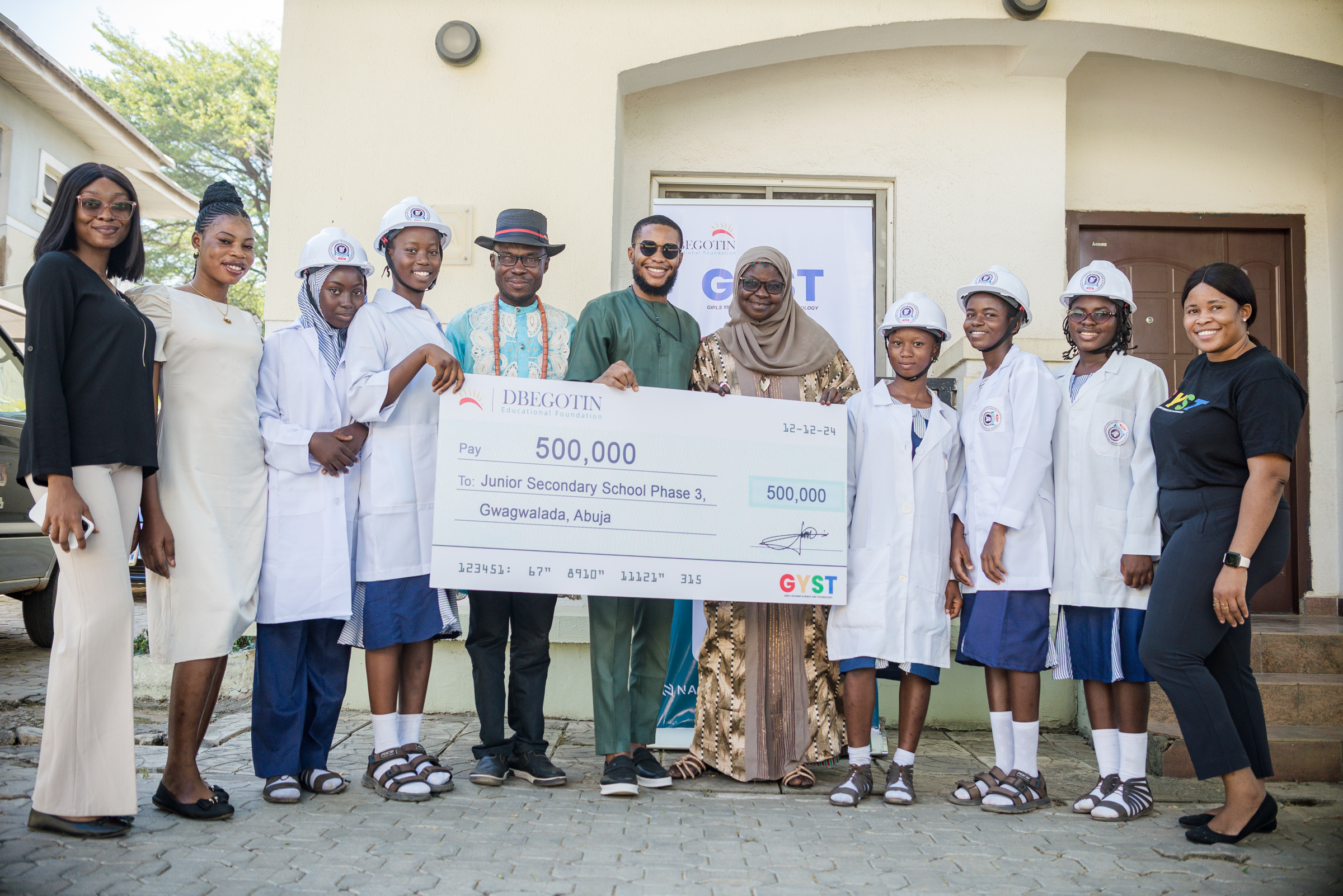It Began With a Whisper of Possibility
In small classrooms scattered across the Federal Capital Territory, a group of young girls once sat in silence, their hands calloused from chores and their minds filled with dreams too big for the confines of their environments. These were not girls anyone expected to stand on a global stage—young, determined, yet bound by limitations: insufficient resources, societal expectations, and the weight of traditions that often exclude them from STEM fields. In Nigeria, where only 13% of women pursue STEM careers (UNESCO, 2021), these girls were outliers—hungry for opportunity but waiting for a catalyst.
That catalyst arrived in the form of the Girls Yielding Science and Technology (GYST) Competition, a project conceived to bridge the gender gap in STEM, inspire innovation, and empower girls to tackle real-world challenges. Backed by the Dbegotin Educational Foundation (DEF) and in partnership with NASENI (National Agency for Science and Engineering Infrastructure) and the Presidential Implementation Committee on Technology Transfer (PICTT), this initiative sought to rewrite the narrative for girls in science.
From Silence to a Symphony of Innovation
When the competition was announced in May 2024, 10 schools were selected to participate, each tasked with identifying a local problem and engineering a solution to address it. The excitement was palpable, but so was the trepidation. For many of these girls, the idea of fabricating a functional machine was daunting. After all, in a country where 40% of children lack access to basic education (UNICEF, 2023), access to advanced tools and mentorship seems like a luxury.
Yet, with the guidance of teachers and the support of DEF, they began to design, tinker, and build. Over months, these young engineers transformed ideas into tangible innovations. Solar panels, wires, and circuits became symbols of hope. The girls grew not just in knowledge but in confidence, stepping into workshops with resolve and emerging with solutions that addressed water scarcity, renewable energy, and sustainable farming.
The Grand Finale: Courage Meets Celebration
October 11th, 2024—the International Day of the Girl Child—marked the competition’s climax. At the NASENI Auditorium in Idu, judges and spectators marvelled at the ingenuity displayed. Each project told a story of resilience and innovation:
- Junior Secondary School Phase 3, Gwagwalada, the Grand Winners, presented a Low-Cost Solar-Powered Multi-Purpose Agricultural Machine. This machine, capable of irrigation, milling, and planting, promised to revolutionize small-scale farming in rural communities. The team was rewarded with ₦500,000 and an additional ₦1,000,000 bonus for innovation from the Chairman of PICTT.
- Junior Secondary School, Jikwoyi, the 1st Runner-Up, created an Eco-Friendly, Fuel-less Electricity Generator, addressing the need for sustainable and accessible energy solutions. Their prize of ₦300,000 was a testament to their vision.
- Junior Secondary School, Kuje, the 2nd Runner-Up, engineered a Low-Cost Fuel-to-Methane Gas Converter, designed to reduce deforestation and provide low-income households with affordable cooking alternatives. Their prize of ₦200,000 celebrated their commitment to environmental sustainability.
Voices of Transformation
“These girls didn’t just build machines; they built futures,” said Jeremiah Oseni, Founder of Dbegotin Educational Foundation. And their voices echoed his sentiment:
“This competition has shown us that girls can do anything they set their minds to,” said a participant from Jikwoyi.
Mrs. Amina Musa, supervising teacher of the Gwagwalada team, added, “This is more than a competition; it’s a movement. These girls now see themselves as leaders and innovators.”
Beyond the Prizes: Lifelong Impact
The prizes were not just monetary. Alongside the financial rewards, each girl received a certificate of recognition—a symbol of their potential and achievements. These accolades will serve as a stepping stone for scholarships, internships, and future opportunities.
Even more transformative is the Mentorship Phase, where these young innovators are paired with leading female engineers from Nigeria, Canada, and the United Kingdom. Through weekly virtual interactions, they will gain insights, skills, and confidence to pursue STEM careers.
For many, the impact is immeasurable. Studies show that girls exposed to mentorship are 3 times more likely to pursue STEM degrees (World Bank, 2022). These girls are not just statistics; they are living proof that empowerment can spark change.
The Ripple Effect: A Call to Action
The success of the GYST competition is a testament to the power of collaboration. Thanks to NASENI, under the leadership of Dr. Khalil Suleiman Halilu, and PICTT, chaired by Hon. Dr. Mohammed Dahiru, these girls have a future that defies the odds. But this is just the beginning.
Globally, it is estimated that closing the gender gap in STEM could add $12 trillion to the global economy (McKinsey, 2023). For Nigeria, investing in girls’ education and innovation is not just a moral imperative but an economic one.
As the GYST journey continues, we invite partners, donors, and the global community to join us in empowering the next generation of STEM leaders. Together, we can build a future where every girl’s potential is realised, and every dream becomes a reality.


